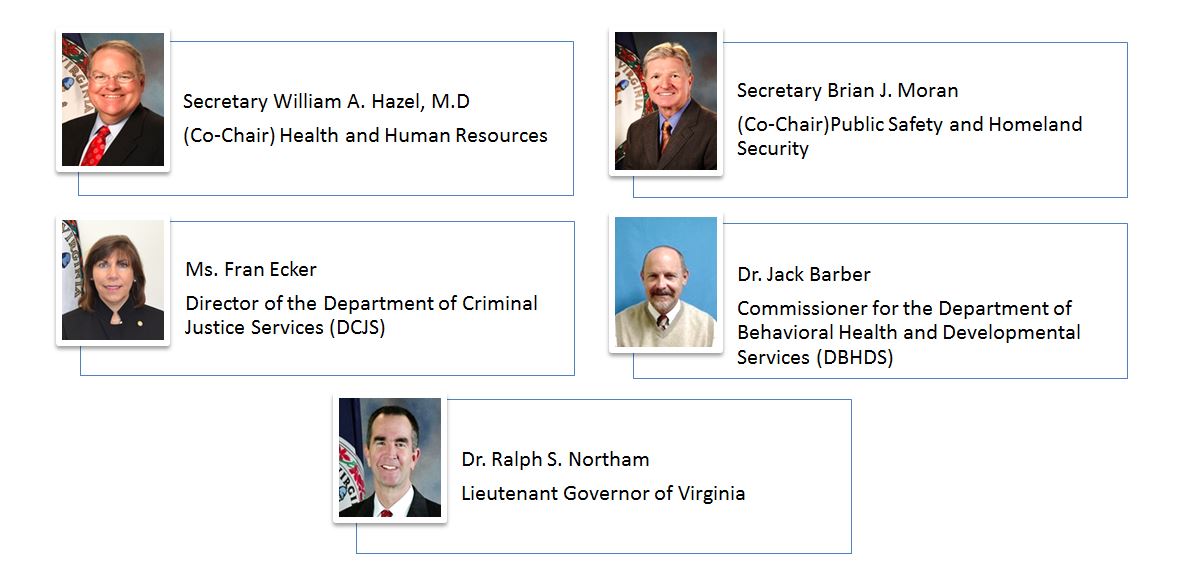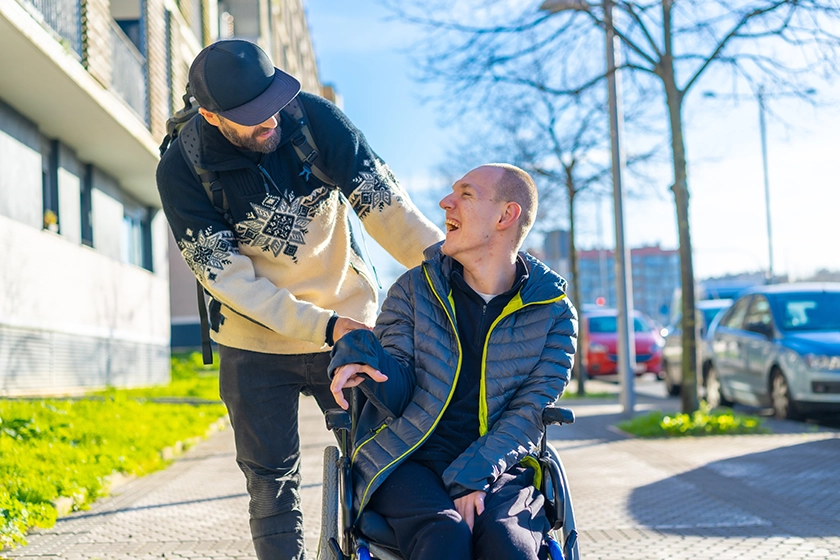Center for Behavioral Health and Justice
.png)
The Center for Behavioral Health and Justice is a center of excellence for the Commonwealth of Virginia designed to address the evolving challenges that exist in coordinating and collaborating across the behavioral health and criminal justice systems. The Center brings together stakeholders at the local, regional, and state level to identify, discuss, and study the needs of justice-involved, behavioral health consumers. The work of the Center is to develop and help implement strategies to effectively meet the needs of this vulnerable population. Research has shown that individuals living with a serious mental illness (or a co-occurring disorder) are at high risk for being incarcerated, and often remain incarcerated for longer periods of time than their counterparts in the general population. These frequent and extended periods of incarceration often result in further psychological decompensation, and can serve to increase an individual’s risk of re-offending. Intervening early on in a consumer’s interaction with the criminal justice system and linking them to appropriate behavioral health treatment services an change the trajectory of an individual’s future mental health recovery and involvement in the criminal justice system.

Mission: The Center’s mission is to support the development and implementation of state, regional and local multi-system responses that prevent and reduce involvement in the criminal justice system for people with behavioral health needs. When diversion is not feasible or appropriate, the Center supports collaboration to enhance the availability and delivery of evidence-based behavioral health services in jails and prisons.
Vision: Virginia’s behavioral health and criminal justice systems will work collaboratively at the state, regional, and local levels to: improve clinical and criminal justice outcomes for individuals living with behavioral health disorders at risk for involvement, or already involved in the criminal justice system; reduce inappropriate incarceration; increase access to services; and enhance public safety.

Click Here for a printable One Page Overview of the Center.
NEW! Center for Behavioral Health and Justice Newsletter: Front and Center
The purpose of the Center for Behavioral Health and Justice’s newsletter Front and Center is to efficiently share updates, information, and resources that support the Commonwealth’s efforts to respond to the needs of individuals with behavioral health concerns who are currently involved, or at risk of involvement in the criminal justice system.
Front and Center will include reports on best practice interventions and strategies, information about opportunities for diversion and treatment, grant announcements, training opportunities, and other important news and announcements from the Center for Behavioral Health and Justice. “Keeping information related to our work timely, useful, and relevant. Front and Center!”
Email the Center Coordinator to get signed up for Front and Center.
Key Roles of the Center
The Center for Behavioral Health and Justice (CBHJ) plays a unique role not currently being filled in the Commonwealth by serving in the following capacities:
The CBHJ provides high level coordination across agencies serving individuals involved in the criminal justice and behavioral health systems; and facilitates connections between state and local partners.
- Facilitates coordination between state and local entities
- Leads coordinated efforts to educate stakeholders and the public on pressing issues
The CBHJ has developed a multi-agency, cross-secretariat vision for serving Virginians involved in both the criminal justice and behavioral health systems, to include the prevention of additional individuals from becoming entwined in the criminal justice system unnecessarily.
- Conducted a comprehensive assessment and identified gaps in the system
- Drawing on best practices, Virginia data, and research, developed a cross-secretariat strategic plan
- Provides research and guidance to the field regarding the implementation of new policies and initiatives
- Serves as a conduit to help inform agency policy decisions
The CBHJ serves as a central hub for the collection and dissemination of best practices; and the identification of new resources and coordinated grant applications.
- Shares best practices and recommendations with the field, state agencies, and other interested stakeholders
- Identifies new resources and assists in the coordination of relevant grant applications
- Partners with research and higher education institutions to increase the Center’s capacity for research and special projects, and adds credibility to its efforts with national, politically neutral data driven perspectives on policy and best practices
For more information about the Center for Behavioral Health and Justice email the Center Coordinator by clicking HERE
Center Structure 
The Center for Behavioral Health and Justice operates through an Executive Committee, a Center Advisory Group (CAG), ad-hoc committees, and standing workgroups called ‘Action Committees’. The three standing committees are focused on the following priority areas:
- Criminal Justice & Behavioral Health Facilities
- Data, Technology, and Information Sharing
- Diversion and Re-Entry
The ‘work’ of the center occurs through the Action Committees. Center Advisory Group members serve on the various committees and members of the Executive Committee serve as committee co-chairs. Subject matter experts are also invited to attend committee meetings to provide additional information, expertise, and guidance upon request. Each Action Committee has a ‘working’ action plan based on the priorities identified by the Center.
The Executive Committee
The Executive Committee provides the final approval of operations, priorities and projects of the Center. The Executive Committee includes the Secretary of Health and Human Resources, the Secretary of Public Safety and Homeland Security, the Lieutenant Governor, the Commissioner of Department of Behavioral Health and Developmental Services, and the Director of Department of Criminal Justice Services or their designee.

The Center Advisory Group
The Center Advisory Group or CAG provides input on the needs within the Commonwealth, and provides counsel on the priorities and projects of the Center. The Center Advisory Group is a diverse group of behavioral health, criminal justice, and other stakeholders from across the Commonwealth. Membership includes: Virginia Department of Corrections, Virginia Department of Health, Virginia Department of Medical Assistance Services, Virginia Department of Juvenile Justice, Virginia State Police, Virginia Department of Veterans Services, Virginia Sheriff’s Association, Virginia Association of Chiefs of Police, National Alliance on Mental Illness – Virginia, Virginia Association of Community Service Boards, Virginia CIT Coalition, Office of the Executive Secretary- Virginia Supreme Court, Mental Health America-Virginia, Virginia Organization of Consumers Asserting Leadership, Virginia Association of Regional Jails, Virginia Indigent Defense Commission, Institute of Law, Psychiatry and Public Policy at the University of Virginia, Virginia Municipal League, Virginia Office of the Attorney General, Veteran’s Administration, Virginia Association of Commonwealth’s Attorneys, Virginia Association of Counties, Virginia State Compensation Board, Virginia Department of Housing and Community Development, General District Courts, private behavioral health providers, and private medical providers.
Center Activities
The Center Advisory Group meets on a quarterly basis and Action Committee Meetings occur prior to Advisory Group Meetings. Center Advisory Group meetings are posted on the Commonwealth Calendar and meeting materials can be found below:
Regular Quarterly CAG Meeting: January 10, 2017 (1pm-3pm)
Regular Quarterly CAG Meeting: April 27th, 2017 (1-3)
Questions about meetings or materials can be directed to the Center Coordinator by clicking HERE.
hr
hr
~~NEW Resource~~
Governor’s Coordinating Council on Homelessness- Funding and Services Matrix
In 2010, Virginia Governor Bob McDonnell (R) established the Governor’s Coordinating Council on Homelessness, which convenes Cabinet-level departments and member agencies to create and implement a plan to effectively address the needs of individuals and families experiencing homelessness.
The council’s focus was on reducing homelessness in the state overall, and from the outset it emphasized shifting to a Housing First model—which prioritizes providing permanent housing as quickly as possible— and using data more effectively to help support people who were experiencing homelessness. Better use of data became one of the council’s five strategic objectives and included increased attention on statewide data collection and coordination in order to track outcomes and demonstrate effectiveness.
The Governor’s Coordinating Council on Homelessness is currently co-chaired by the Secretary of Commerce and Trade and the Secretary of Health and Human Resources. Members include the Secretariat of Education and the Department of Veterans Services, among others. The Coordinating Council meets quarterly, and standing committees meet monthly, bi-monthly, or as needed. Some of those committees include:
- Performance and Impact: focusing on performance measures and efforts to create a statewide HMIS, among other things
- Solutions: focusing on strengthening approaches like rapid rehousing and permanent supportive housing, as well as our special populations work
- Inter-agency Partnership to Prevent and End Youth Homelessness: focusing on how we engage all our resources, including mainstream resources, to end homelessness among youth ages 14-24
- Ending Veteran Homelessness: focusing on continuing to support communities as we sustain our effective end of Veteran homelessness
- Criminal Justice and Homelessness Work Group: focusing on facilitating and coordinating efforts related to the intersection between criminal justice and homelessness
The Center for Behavioral Health and Justice supports the work of the Governors’ Coordinating Council and contribute to the Criminal Justice and Homelessness Work group. Click HERE to download the Criminal Justice and Homelessness Workgroup’s Funding and Services Matrix, made in collaboration with the Center for Behavioral Health and Justice.
The Funding and Services Matrix includes a listing of funding sources and services across Virginia for individuals that are justice involved and experiencing homelessness. Contact information for each service agency is also provided.
Click HERE to recent article titled: How Virginia Uses Collaboration and Coordination to End Homelessness State-Wide
Helpful Links for Funding Opportunities
Substance Abuse and Mental Health Services Administration (SAMHSA)
Virginia Department of Criminal Justice Services (DCJS)
Bureau of Justice Assistance
National Institute of Justice
Office of Justice
National Institute of Corrections
Documents
First Episode Incarceration Creating a Recovery-Informed Framework for Integrated Mental Health and Criminal Justice Responses
Information Sharing in Criminal Justice-Mental Health Collaborations
Screening and Assessment of Co-Occurring Disorders in the Justice System
Adults with Behavioral Health Needs Under Correctional Supervision
Law Enforcement Responses to People with Mental Illnesses
Improving Responses to People with Mental Illnesses at the Pretrial Stage
Videos
Council of State Governments Justice Center: Reducing the Number of People With Mental Illnesses In Jails
Voices of Jericho: Stories of Jail Diversion
Other Centers of Excellence for Behavioral Health and Justice
Florida
Illinois
Massachusetts
Ohio
Pennsylvania
Veterans Resources
Veterans Re-Entry Search Services (VRSS): This secure Web site enables correctional and other criminal justice system entities to identify inmates or defendants who have served in the United States (U.S.) military. The U.S. Department of Veterans Affairs (VA) makes this service available to facilitate its own direct outreach to these Veterans, and to inform the development of Veteran-specific programs in the criminal justice system.






